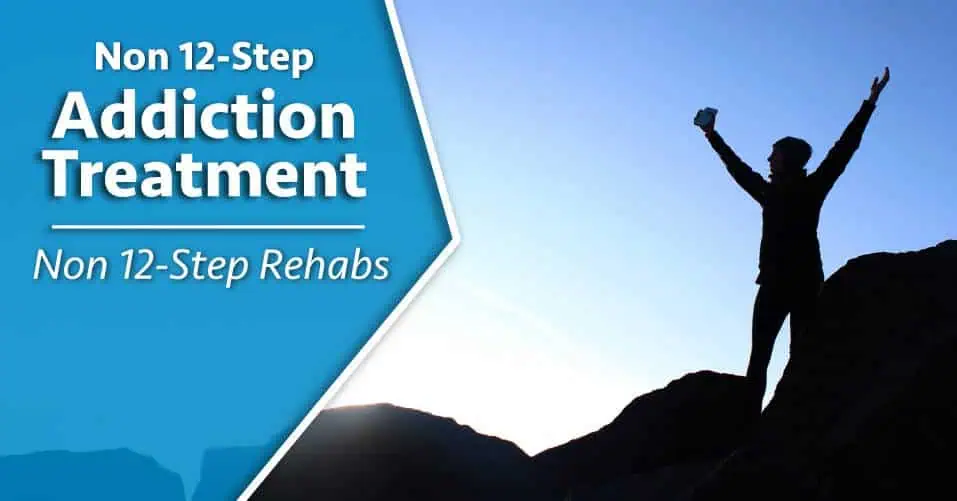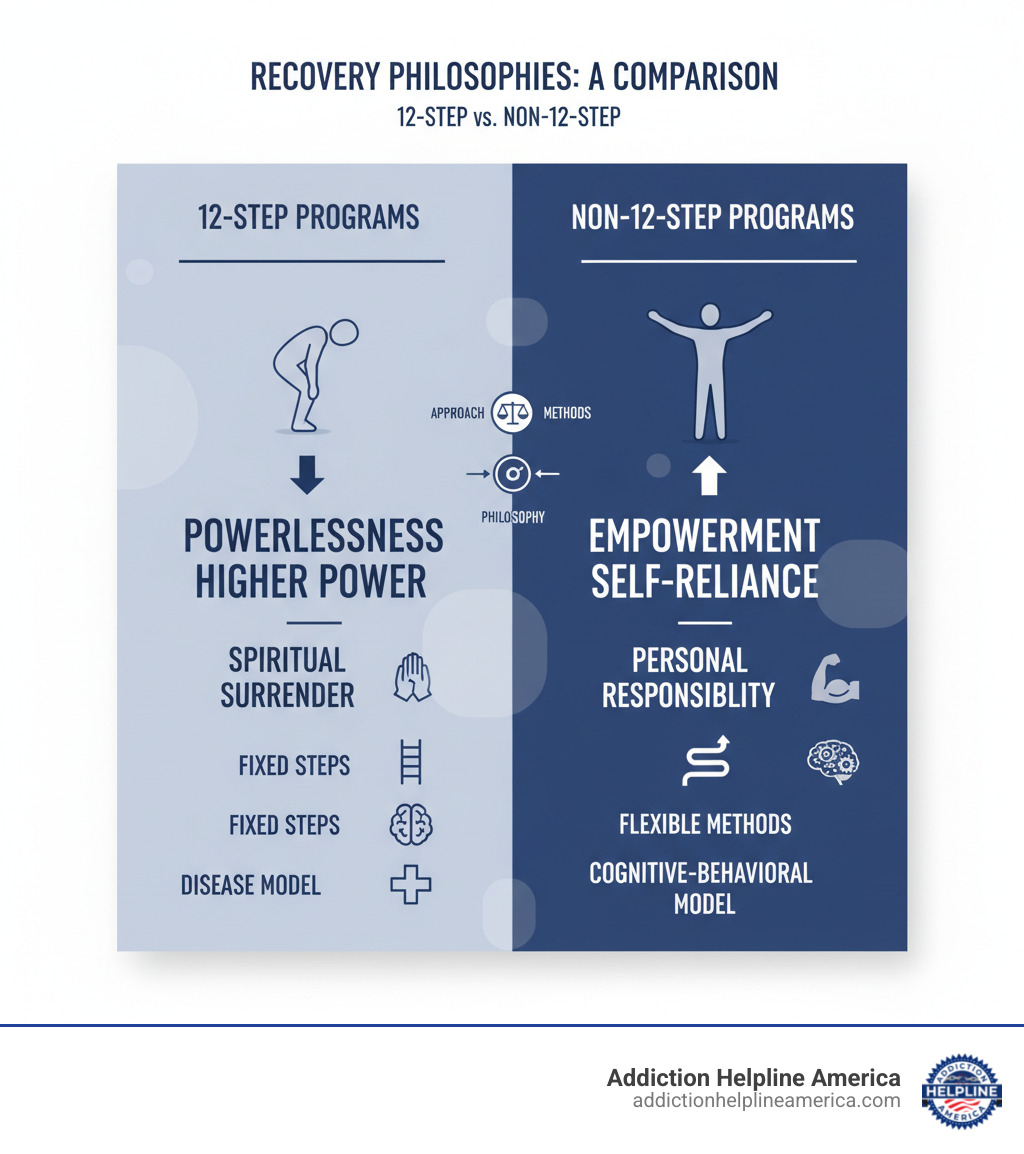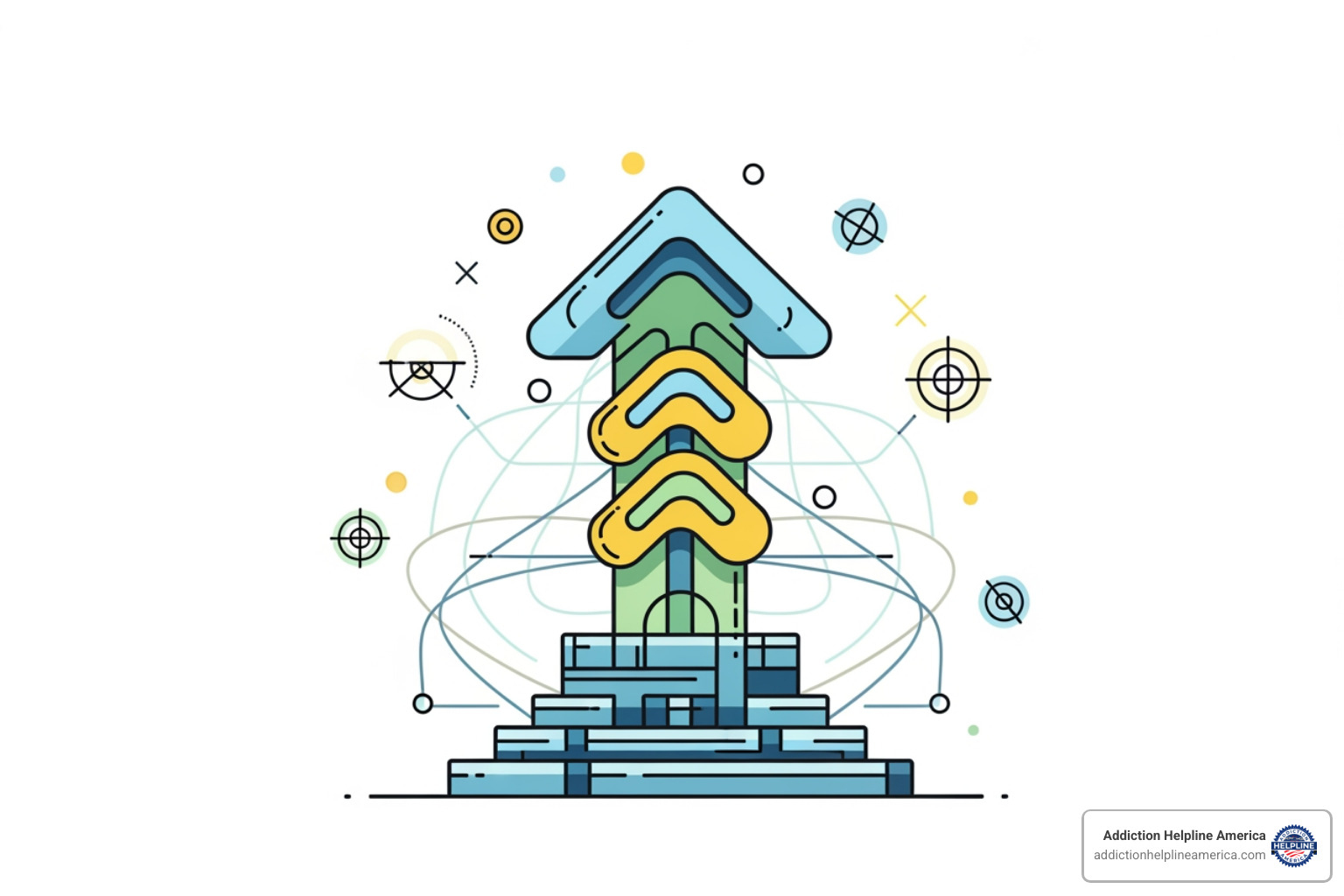
Understanding Your Options: Why Non-12-Step Programs Matter
Non 12 step programs are recovery alternatives that focus on personal empowerment and evidence-based methods rather than spiritual surrender. They appeal to those who prefer a secular, scientific approach to addiction, emphasizing internal control and individualized plans.
Key differences between 12-step and non-12-step programs:
- Philosophy: 12-step programs begin with admitting powerlessness, while non-12-step programs focus on self-management.
- Spirituality: 12-step programs are spiritual; non-12-step programs are typically secular.
- Structure: 12-step programs follow fixed steps; non-12-step programs offer flexible, personalized approaches.
- Methods: 12-step programs use peer support and sponsorship; non-12-step programs use evidence-based therapies like Cognitive Behavioral Therapy (CBT).
- Goals: 12-step programs require total abstinence; some non-12-step programs allow for moderation.
If you’re struggling with addiction, know that the traditional 12-step model isn’t the only option. Research shows that 34% of people who recovered from alcohol problems used alternatives to 12-step groups. Many find that programs emphasizing personal responsibility and secular support better match their needs.
The reality is that recovery isn’t one-size-fits-all. What works for one person might not resonate with another. Some thrive with spiritual awakening, while others need a program grounded in psychology and self-empowerment.
At Addiction Helpline America, we help individuals and families steer addiction recovery by connecting them with both traditional and non 12 step treatment options. Our mission is to ensure you can make an informed choice about the right path for you or your loved one.

Simple guide to non 12 step:
Understanding the Landscape: 12-Step vs. Non-12-Step Approaches
When seeking help for addiction, you’ll encounter two main paths: the traditional 12-step model and non 12 step alternatives. Both aim for lasting sobriety, but they take different routes. Understanding these differences is key to finding the approach that matches your beliefs, because the best recovery program is the one you’ll stick with.
The 12-step model, like Alcoholics Anonymous (AA), views addiction as a disease that renders you powerless. The solution involves surrendering to a “Higher Power” and working through prescribed steps with peer support. In contrast, non 12 step programs frame addiction as a manageable condition. Instead of powerlessness, they focus on your personal strength and ability to change. They are typically secular, rely on evidence-based psychological methods, and offer more flexibility.
One path asks you to surrender control; the other helps you reclaim it. Neither is inherently better—what works depends on you.
| Principle | 12-Step Approach | Non-12-Step Approach |
|---|---|---|
| View of Addiction | Disease model; individuals are powerless | Behavioral/cognitive model; manageable condition |
| Role of Self | Surrender to a Higher Power | Personal empowerment, self-reliance, internal control |
| Spirituality | Central to recovery (Higher Power concept) | Typically secular; spiritual aspects are optional/personal |
| Program Structure | Fixed 12 steps and traditions | Flexible, individualized, evidence-based methods |
| Change Mechanism | Spiritual awakening, peer support, making amends | Skill-building, cognitive restructuring, self-management |
The 12-Step Model at a Glance
The 12-step model is the most widely recognized approach to recovery. Its philosophy requires acknowledging powerlessness over addiction and believing a “Higher Power” can restore sanity. This concept of surrender is central.
Participants work through the steps with a sponsor and attend regular meetings to share experiences. The process involves taking a moral inventory, making amends, and helping others. The community support is a major draw for many. While often seen as religious, AA itself describes its fellowship as non-professional and self-supporting, though the spiritual component is essential.
The Non-12-Step Philosophy
Non 12 step programs start from a different place: instead of admitting powerlessness, they help you find your power. They are built on the belief that you have the internal resources to overcome addiction with the right tools.
These programs use evidence-based techniques like cognitive behavioral therapy (CBT) to change unhealthy thought patterns and motivational interviewing to strengthen your resolve. The idea is that addictive behaviors are learned and can be replaced with healthier habits.
A key appeal is their secular foundation; there’s no requirement to believe in a Higher Power. This makes them attractive to those who prefer a scientific, psychology-based approach.
Personalization is another core element. Rather than following fixed steps, these programs adapt to your individual needs and goals. The focus is on building a flexible recovery plan that makes sense for your life.
At Addiction Helpline America, we understand both paths and have helped thousands find the right fit, whether it’s a 12-step program, a non 12 step alternative, or a combination of both.
Call Now – Your Journey to Recovery Begins Today!

Take the first step towards a healthier life! Call now to connect with our compassionate team and start your recovery journey today. Your path to healing awaits!
Our recovery specialists are available 24/7 to provide support, and all calls are confidential and free. Reach out anytime – we’re here to help!
Exploring Popular Non-12-Step Recovery Approaches
Today’s recovery landscape offers many paths beyond the traditional model. Various non 12 step programs provide peer support and community through different philosophies. Having options means you can find an approach that truly fits who you are.

Self-Management and Recovery Training (SMART)
SMART Recovery is a leading science-backed non 12 step program. It stands for Self-Management and Recovery Training and empowers you to take charge of your recovery using tools from Cognitive Behavioral Therapy (CBT).
The program is built on a 4-Point Program: (1) building and maintaining motivation, (2) coping with urges, (3) managing thoughts, feelings, and behaviors, and (4) living a balanced life. SMART Recovery offers accessible online and in-person meetings, with some rehab facilities incorporating its methods.
Women-Focused Recovery Groups
Women for Sobriety (WFS) is a non 12 step program created by and for women. It focuses on positivity, self-responsibility, and emotional growth, rather than on past mistakes. The program is centered on 13 Acceptance Statements that affirm members’ worth and commitment to recovery.
WFS meetings are typically small and intimate, creating a safe space for sharing. The program also encourages holistic wellness practices. For many women, this positive, forward-looking approach addresses their unique challenges.
Secular and Peer-Based Recovery Communities
Other strong secular options exist in the non 12 step world. LifeRing Secular Recovery is a network of non-religious support groups focused on personal empowerment. Its philosophy is that recovery is about strengthening your “Sober Self” over your “Addict Self.” Members develop their own recovery strategies, and meetings focus on current successes and challenges.
Another option is Secular Organizations for Sobriety (SOS), a network of autonomous groups that champion self-empowerment and rational thought. SOS meetings involve members sharing experiences and working together to stay sober without any spiritual component.
Other Notable Alternatives
The non 12 step landscape continues to evolve. Moderation Management (MM) is unique because it doesn’t require complete abstinence. It helps people who want to moderate their alcohol consumption rather than quit entirely. This harm reduction approach provides tools to set limits and develop healthier habits. While not for everyone, it’s a valid path for some.
Other approaches include mindfulness-based programs and groups based on therapies like Dialectical Behavior Therapy (DBT). The key takeaway is that if one approach doesn’t feel right, other options are available.
The Core Benefits of a Non-12-Step Path
Choosing a non 12 step path is about finding what works for you. These programs offer distinct advantages centered on flexibility, personalization, and a strong foundation in scientific research.

Empowerment and Self-Reliance
The most profound difference in non 12 step programs is their view of your role in recovery. Instead of starting from powerlessness, they teach that you have the internal capacity to overcome addiction. This shift helps develop an internal locus of control—the belief that your choices shape your outcomes.
These programs focus on building practical coping skills for managing triggers and cravings. This proactive approach to recovery means you’re not defined by your past but are actively taking personal responsibility for your future. This sense of agency is incredibly empowering.
A Secular and Scientific Foundation
For those who are atheist, agnostic, or simply prefer to keep faith separate from recovery, the spiritual elements of 12-step programs can be a barrier. Research shows that members of non 12 step alternatives are generally less religious.
Non 12 step programs offer a secular path grounded in psychology and neuroscience. They rely on evidence-based therapies like Cognitive Behavioral Therapy (CBT), which helps change thought patterns contributing to addiction, and Motivational Interviewing, which strengthens your internal drive to change. This logical, structured approach makes recovery feel more accessible, as you learn the mechanics of how to rewire your brain’s responses.
Flexibility in Goals and Methods
Recovery isn’t a rigid, one-size-fits-all process. Non 12 step programs accept this with adaptable recovery plans customized to your circumstances and goals.
This flexibility extends to recovery goals. While many programs advocate for abstinence, they recognize that recovery isn’t always black and white. Some, like Moderation Management, focus on harm reduction. Research has found that members of programs like LifeRing and SMART Recovery are less likely to endorse the most stringent abstinence goal compared to 12-step members.
This approach meets people where they are, acknowledging that lasting change can happen in stages. Your recovery becomes truly yours, built on a foundation that aligns with your personal values.
Call Now – Your Journey to Recovery Begins Today!

Take the first step towards a healthier life! Call now to connect with our compassionate team and start your recovery journey today. Your path to healing awaits!
Our recovery specialists are available 24/7 to provide support, and all calls are confidential and free. Reach out anytime – we’re here to help!
Who Thrives in a Non-12-Step Environment?
Recovery is not one-size-fits-all. While 12-step programs have helped millions, they don’t resonate with everyone. The real question is which path is right for you. Understanding who thrives in non 12 step environments can help you make a more confident decision.

Individuals Seeking a Secular or Scientific Approach
Not everyone connects with the concept of a “Higher Power.” For agnostics, atheists, or anyone preferring to separate recovery from spiritual beliefs, non 12 step programs can feel like a better fit. These approaches are grounded in psychological research and proven therapeutic techniques, not spiritual surrender.
Research shows that 34% of those who recovered from alcohol problems used alternatives to 12-step groups, confirming that many people find success through secular, science-based support.
People Who Prefer a Self-Directed Model
The concept of being “powerless” doesn’t sit well with everyone. If you draw strength from feeling in control of your life, a non 12 step model that emphasizes personal agency may align better with your worldview. These programs focus on what you can do—build skills, make choices, and develop coping strategies—putting you in the driver’s seat of your recovery.
A study examining the efficacy of secular groups found that organizations like SMART Recovery can be equally effective for those who choose them, with members showing high satisfaction. This confirms that when a program matches your philosophy, you’re more likely to succeed.
Those with Co-Occurring Mental Health Conditions
Addiction often co-occurs with mental health challenges like anxiety, depression, or PTSD (a dual diagnosis). This requires an integrated approach that addresses both issues simultaneously.
Non 12 step programs, especially within professional treatment settings, often excel at providing this integrated care. They use evidence-based therapies like Cognitive Behavioral Therapy (CBT) and Dialectical Behavior Therapy (DBT) to treat both substance use and mental health concerns in a coordinated way. Addressing the full picture of your health provides a much stronger foundation for lasting recovery.
For more on this topic, see our Dual Diagnosis Treatment Costa Mesa Guide. Understanding how these conditions interact is a crucial step toward finding the right path.
How to Choose the Right Recovery Program for You
Finding the right recovery program is a personal decision. There’s no single “right” answer that works for everyone. The best program is one that aligns with your values and supports the life you want to build. Whether you need the structure of a 12-step program or the self-directed approach of a non 12 step alternative, the key is finding your fit.
Key Questions to Ask Yourself
Before committing, take a moment for honest self-reflection to understand what you need to succeed. Consider the following:
- Spirituality: Are you comfortable with the idea of a “Higher Power,” or do you prefer a secular approach?
- View of Addiction: Do you see addiction as something you’re powerless over, or as a manageable behavior you can change through new skills?
- Structure: Do you thrive with a clear, step-by-step roadmap, or do you prefer a flexible, personalized plan?
- Methods: Are you drawn to programs based on scientific evidence and psychological therapies like CBT?
- Community: Do you prefer a large, anonymous group or a smaller, more intimate setting?
Trying Out Different Meetings
Most recovery support groups, whether 12-step or non 12 step, welcome visitors to open meetings without any commitment. Think of it as test-driving your options. You are free to just listen and observe.
Attend a few different types of meetings, both in-person and online. Visit an AA or NA meeting to see if the philosophy resonates. Then, explore non 12 step options like SMART Recovery to experience its evidence-based tools. Women might consider a Women for Sobriety meeting, while those seeking a purely secular environment could try LifeRing or SOS.
The goal is to gather information and notice how each environment makes you feel. You might even find that a combination of different approaches works best for you.
Seeking Professional Guidance for Your Non-12-Step Journey
Navigating these options can be overwhelming. An addiction specialist can assess your history, co-occurring conditions, and personal preferences to recommend programs that truly fit.
This is where Addiction Helpline America can help. We connect people with treatment centers across our network in states like California, Florida, Texas, and Pennsylvania that offer non 12 step programs. Whether you need inpatient care, outpatient support, or help exploring mutual help groups, we’re here to help you create a custom treatment plan.
Our services are free and confidential. If you’re ready to explore your options, check out our Find a Rehab Ultimate Guide or give us a call. Let us help you take the next step.
Frequently Asked Questions about Non-12-Step Programs
Are non-12-step programs effective?
Yes, non 12 step programs can be highly effective, particularly when the philosophy aligns with your personal beliefs. Effectiveness depends on finding a program that resonates with you and that you can commit to over time.
Evidence suggests that secular mutual-help organizations such as SMART and Women for Sobriety may be equally effective for those who choose them. One study found that members of Women for Sobriety, LifeRing, and SMART Recovery showed equivalent involvement and higher satisfaction compared to their 12-step counterparts. This indicates that people in these programs are actively engaged and connecting with the community.
Do non-12-step programs require complete abstinence?
This is where non 12 step programs show their flexibility. Most—including SMART Recovery, LifeRing, and Women for Sobriety—are abstinence-based and view it as the safest goal for most people.
However, some alternatives, like Moderation Management (MM), focus on harm reduction by helping people moderate their consumption rather than quit entirely. Research has also found that LifeRing and SMART members were less likely to endorse the most stringent abstinence goal than 12-step members, reflecting a greater flexibility in how individuals define their recovery.
Can I combine non-12-step and 12-step approaches?
Absolutely. Many people create a hybrid recovery plan that draws from both non 12 step and 12-step approaches. There is no rule that you must choose only one path.
You could use the evidence-based tools from a SMART Recovery meeting to manage cravings while also benefiting from the community and fellowship of an AA meeting. The goal is to build a comprehensive, personalized recovery toolkit that works for you. We encourage you to explore all available resources to find the support system that keeps you moving forward.
Call Now – Your Journey to Recovery Begins Today!

Take the first step towards a healthier life! Call now to connect with our compassionate team and start your recovery journey today. Your path to healing awaits!
Our recovery specialists are available 24/7 to provide support, and all calls are confidential and free. Reach out anytime – we’re here to help!
Conclusion
Your path to healing is as unique as you are. Throughout this guide, we’ve explored how non 12 step programs provide powerful, evidence-based alternatives that focus on personal empowerment, scientific methods, and secular foundations.
Whether you’re drawn to the cognitive tools of SMART Recovery, the affirming environment of Women for Sobriety, or the peer support of LifeRing, the message is clear: you have options. These programs help people reclaim their lives by strengthening their internal resources.
The best program is the one that speaks to you, motivates you, and gives you the tools to build the life you deserve. Some thrive in 12-step meetings, while others need the self-directed approach of non 12 step programs. Many find a combination of both is ideal.
What matters most is taking the first step, and you don’t have to do it alone. At Addiction Helpline America, we’ve helped thousands of people across the U.S.—from California to Florida, Texas to Pennsylvania—find treatment that aligns with their values. Our team is here to listen without judgment and connect you with resources that fit.
If you’re ready to explore what’s possible, browse our Find the right drug rehab program for your needs guide or contact us for free, confidential support. Your recovery is possible, and we’re here to help you find your path.
Our helpline is 100%
free & confidential
If you or someone you care about is struggling with drug or alcohol addiction, we can help you explore your recovery options. Don’t face this challenge alone—seek support from us.
Programs
Resources
Will my insurance
cover addiction
treatment?
We're ready to help
Find the best
drug or alcohol treatment
center
Are you or a loved one struggling with addiction? Call today to speak to a treatment expert.






